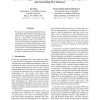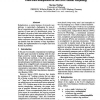216 search results - page 6 / 44 » From Constraints to Finite Automata to Filtering Algorithms |
IJCAI
1993
13 years 8 months ago
1993
One of the open problems listed in Rivest and Schapire, 1989] is whether and how that the copies of L in their algorithm can be combined into one for better performance. This pape...
STACS
2000
Springer
13 years 11 months ago
2000
Springer
Abstract. Block codes are first viewed as finite state automata represented as trellises. A technique termed subtrellis overlaying is introduced with the object of reducing decoder...
NAACL
2003
2003
Syntax-based Alignment of Multiple Translations: Extracting Paraphrases and Generating New Sentences
13 years 8 months ago
We describe a syntax-based algorithm that automatically builds Finite State Automata (word lattices) from semantically equivalent translation sets. These FSAs are good representat...
CONCUR
2006
Springer
13 years 9 months ago
2006
Springer
In regular inference, the problem is to infer a regular language, typically represented by a deterministic finite automaton (DFA) from answers to a finite set of membership querie...
ANLP
2000
13 years 8 months ago
2000
Reduplication, a central instance of prosodic morphology, is particularly challenging for state-ofthe-art computational morphology, since it involves copying of some part of a pho...


